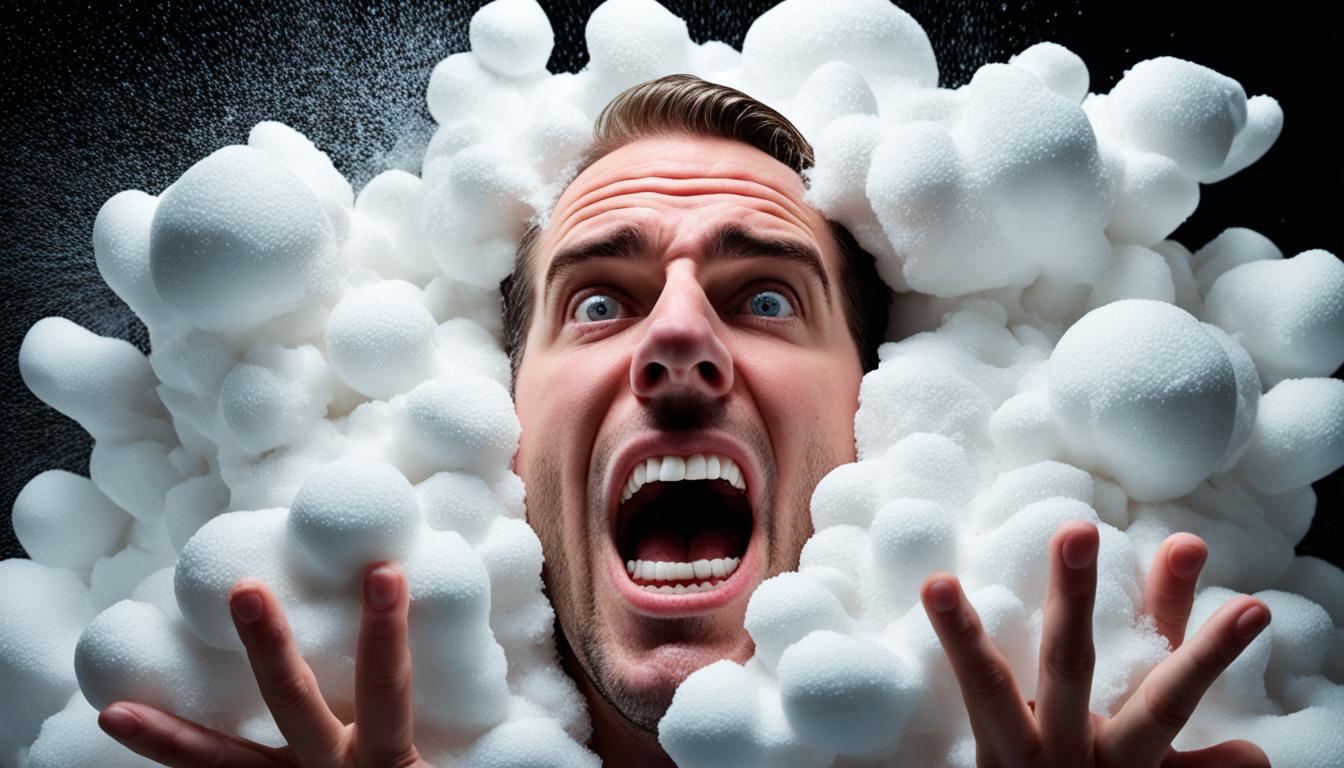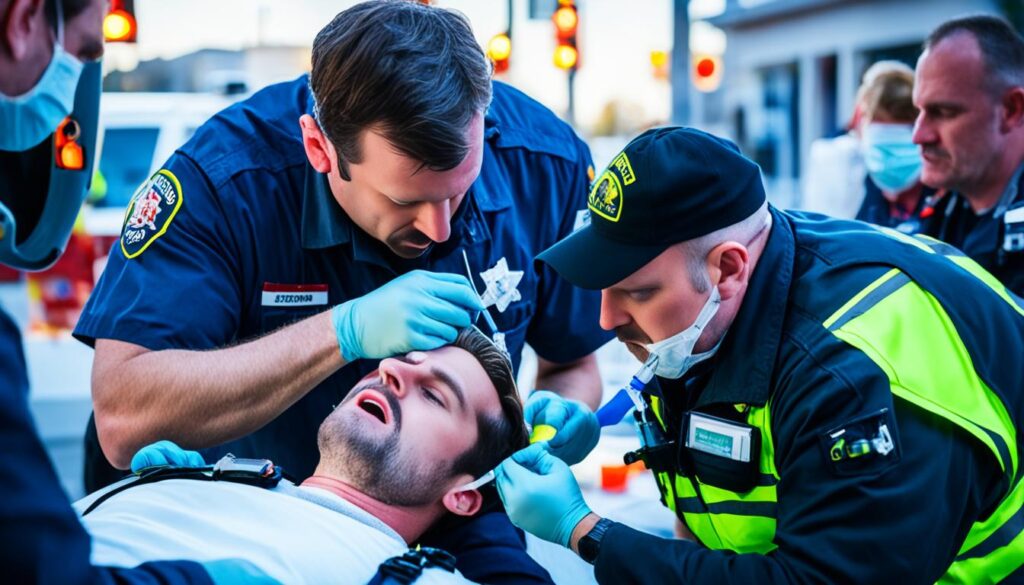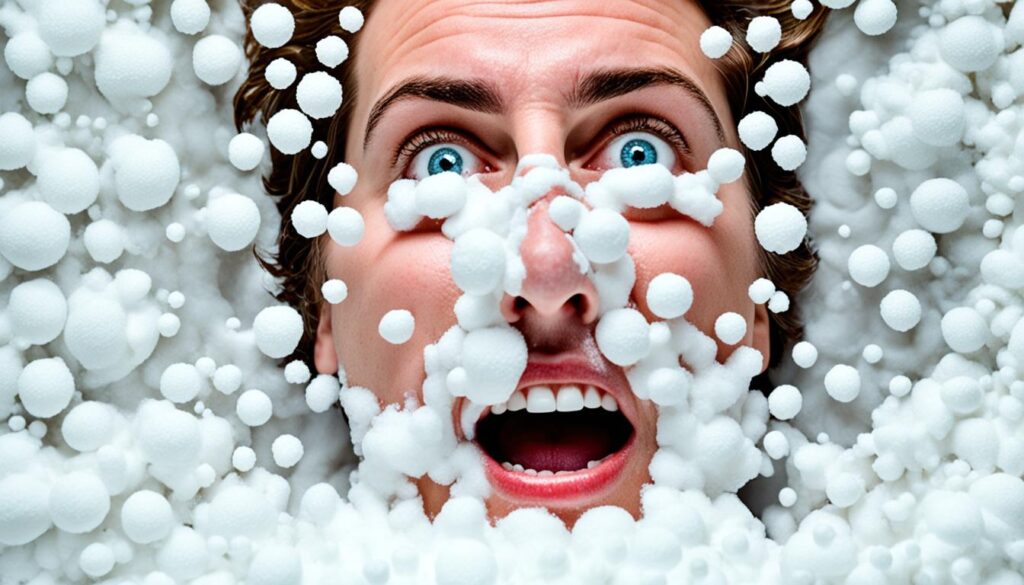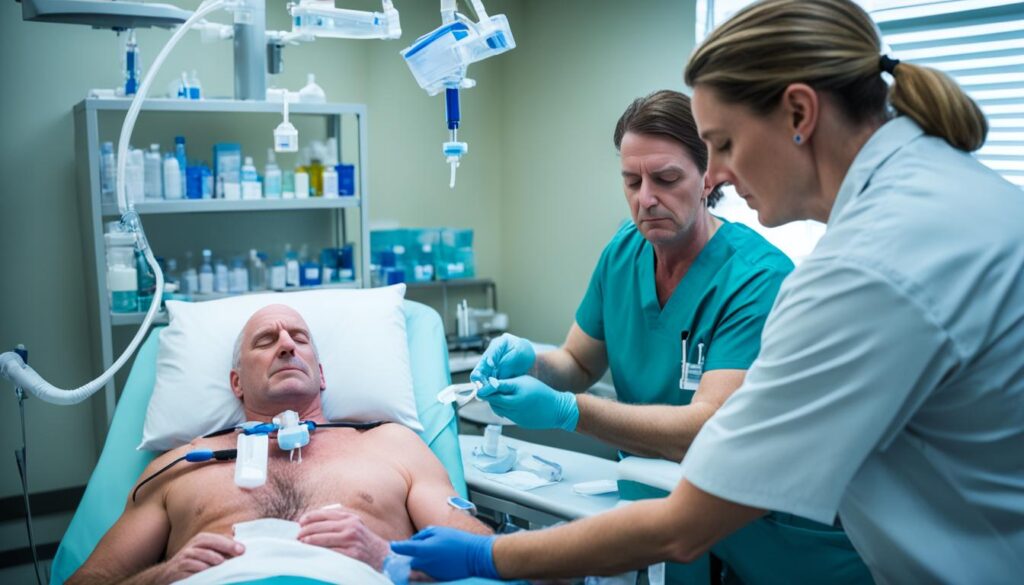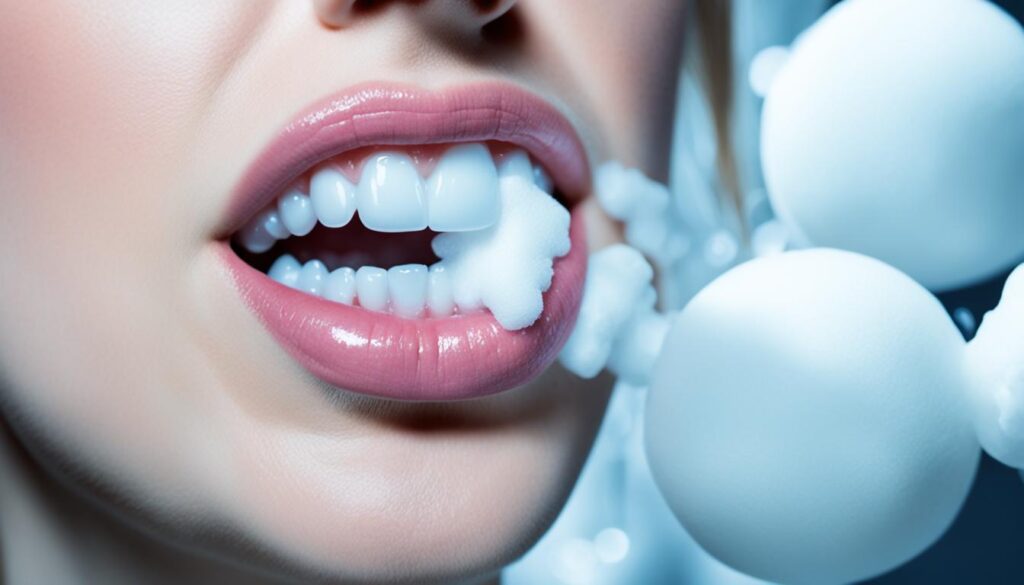Ever wondered why some people froth at the mouth? It’s a sign that often worries us. It might mean something serious. We’ll look into what causes this. Could it be something as risky as rabies or as simple as taking too many drugs? Let’s find out the facts.
Froth in the mouth can happen for many reasons. A common one is a drug overdose, leading to potential danger. If not treated quickly, it can be deadly. Seizures are another trigger. They cause the body to make more spit, which can create froth when it mixes with air.
Rabies is a contagious disease that makes people foam at the mouth. It spreads through saliva, like in a dog bite. It affects the brain and is very dangerous. If you’re worried about rabies, talk to a doctor right away.
Congestive Heart Failure might cause froth in the mouth. This happens when the lungs get filled with fluid. It looks similar to foaming but is due to a different health issue. A rare note: a 2017 study suggested that too much of the drug fentanyl could also cause frothing.
If you see someone foaming at the mouth, it’s really serious. Act fast. Make sure they can breathe and call for emergency help. Treatment will depend on the reason but always needs medical help quickly.
Key Takeaways:
- Foaming or frothing at the mouth can be caused by drug overdose, seizures, pulmonary edema, or rabies.
- Drug overdose is one of the most common causes and can be fatal without prompt medical treatment.
- Rabies is a viral disease transmitted through saliva and is a medical emergency requiring immediate attention.
- Congestive Heart Failure can lead to pulmonary edema, causing froth when breathing.
- When encountering someone foaming at the mouth, it is important to roll them onto their side, ensure clear airways, and call for emergency medical assistance.
Understanding the causes of foaming at the mouth can save lives. If you see someone with this symptom, act quickly. Call for help to get the right medical care. Doing this can be crucial and might help a lot.
Causes of Foaming at the Mouth
Foaming at the mouth is known as frothing at the mouth. It can happen for different reasons. These include drug overdose, seizures, pulmonary edema, and rabies. Knowing what causes it helps in giving the right treatment.
Drug Overdose
Too many drugs, especially opioids like fentanyl, can make you foam at the mouth. Opioid overdose can make you drool a lot, which turns into foam. Although rare, a 2017 report showed that foaming can happen with fentanyl too.
If someone has overdosed, they might be floppy and have cold, sweat skin. They could have blue or purple nails and make gurgling sounds. Their heart and breathing might be very slow, and they might pass out without warning. They won’t be able to talk.
Seizures
Some seizures, like tonic-clonic seizures, can also cause foaming. During these seizures, saliva builds up because the person can’t swallow. So when they clench their teeth, the saliva comes out as foam. This froth often comes with drooling and small bubbles.
If you see someone having a seizure, it’s key to keep them safe. Don’t put anything in their mouth. Note how long the seizure lasts and gently lay them on their side when it stops.
Pulmonary Edema
Pulmonary edema, where the lungs fill with fluid, can also make you foam. This extra fluid also means more saliva collects in the mouth. Then, foam forms.
Treating pulmonary edema can need drugs, oxygen, and even help from machines like ventilators. The treatment will depend on how bad the condition is.
Rabies
Rabies is a virus that attacks the brain and spinal cord. It causes throat muscles to stop working and saliva to build up. So, the person can’t swallow, and that leads to foaming.
If someone shows signs of rabies by foaming at the mouth, get medical help at once. This can prevent severe problems like organ failure or death. Treating rabies includes washing any bites with soap and water, getting shots, and taking antiviral drugs.
Foaming at the mouth is a serious sign needing quick medical care. Whether it’s from drugs, seizures, lung issues, or rabies, immediate help is crucial. It’s the first step to finding out the cause and treating it.
Foaming at the Mouth Due to Drug Overdose
Drug overdose can lead to foaming at the mouth, especially with opioids like fentanyl. This happens when someone takes too much of the drug, affecting their breathing. They might drool or have saliva gather because their body can’t handle the opioids.
Opioid overdose has several signs, including foaming at the mouth. People may also become limp, have a pale face, slow heart rate, or stop breathing. It’s vital to spot these symptoms and get help right away.
The care for someone foaming at the mouth from an overdose is intense and quick. Naloxone, a drug that can reverse opioid overdoses, might be used to help them breathe normally again. It’s also important to carefully watch the person to avoid severe body harm, coma, or death.
The opioid crisis is a big health issue in the US, with drugs like fentanyl causing many deaths. We need to make sure everyone knows the risks of a drug overdose. Encouraging fast medical help can save lives.
Foaming at the Mouth Due to Pulmonary Edema
Pulmonary edema happens when the lungs fill with fluid. This makes it hard to breathe and can lead to foaming at the mouth.
The froth from pulmonary edema might appear pink. It is a mix of saliva and labored breath. When this happens, the person may also experience wheezing, a fast heartbeat, and cough up frothy spit. These are strong signs of the condition.
Now, there are two main kinds of pulmonary edema: acute and chronic. Acute pulmonary edema is an emergency. This needs quick medical care.
On the other hand, chronic pulmonary edema shows up slowly. People with this type might get tired easily, gain weight fast, and have swollen legs. They also might struggle to breathe when they lay down.
Doctors figure out what’s wrong through tests. They check the heart, lungs, and blood. Knowing the cause helps with the right treatment.
For treatment, it depends on what’s causing the pulmonary edema. Often, people get diuretics to lower fluid, oxygen to help breathing, and sometimes machines to aid the lungs. In bad cases, kidney help might be needed if they’re also affected.
Foaming at the Mouth Due to Seizures
Tonic-clonic seizures, a specific kind of seizure, can make you drool, foam, or bubble at the mouth. They affect around 3.4 million people with epilepsy in the USA. Epilepsy is a condition that causes repeated seizures.
During a tonic-clonic seizure, the mouth may fill with spit. This spit mixes with air, creating foam. The foaming happens because air is pushed out hard from the lungs during the seizure’s muscle movements.
Tonic-clonic seizures show other obvious signs too. They start with sudden unconsciousness and then whole-body shaking. There are strange muscle movements, muscles getting really tight, and sometimes the person can’t hold their pee.
These seizures usually last 1 to 3 minutes. But anything over 5 minutes means it’s an emergency. You should call 911 right away.
If you see someone have a tonic-clonic seizure, take note of what happens. This will help doctors with diagnosis and treatment. Tests like MRI and EEG may be needed to find the cause.
Treatment for epilepsy and seizures can vary. Doctors often give anti-seizure drugs. Sometimes, they recommend other treatments like nerve stimulations or even surgery.
Foaming at the Mouth Due to Rabies
Rabies is a virus that affects the nervous system. It can cause an infected person to foam at the mouth. This happens because the virus weakens the throat muscles. This makes swallowing hard and increases saliva production. Saliva mixes with gases in the mouth, leading to foaming.
The first signs of rabies are similar to the flu. This includes a fever, feeling weak, and a headache. You might also feel a tingling around the wound. The sickness can get worse. Later signs can be paralysis, getting very angry, seeing things that aren’t there, seizures, and finding it hard to swallow.
Rabies spreads through the saliva of sick animals. The most common way is being bitten. This is a very serious problem and needs fast medical care. Treatment includes cleaning the wound well, taking antiviral drugs, and getting post-exposure shots.
In the U.S., bats are the biggest risk for rabies. Raccoons can also spread the virus, according to the CDC. It’s key to stay away from wild animals. Also, make sure your pets get their rabies vaccines.
If you think you’ve been around rabies, see a doctor right away. Sadly, there is no cure if the sickness starts showing. But, getting medical help can lower the risk and make things better.
Treatment for Foaming at the Mouth Due to Drug Overdose
In cases of drug overdose, getting immediate medical help is key. It’s mainly to avoid serious complications. Overdoses, including opioids like fentanyl, can cause foaming at the mouth. This is a clear sign of a medical emergency.
If someone overdoses, quick action is vital. Getting them to a hospital fast is a must. Overdoses can turn deadly very quickly.
The treatment includes different steps, depending on the case. Naloxone, an opioid reversal drug, might be used. It counteracts the drug’s effects. This treatment aims to stop breathing problems and lower foaming amounts.
Doctors might also use other methods. They could pump the stomach or give activated charcoal to remove toxins. Stomach pumping cleans out harmful substances. Activated charcoal absorbs drugs, preventing their spread in the body.
Treatment types vary by case, cover any complications. For instance, if the overdose leads to a heart attack, more steps are needed. This might include drugs, oxygen, or using a ventilator.
The main goal is to stabilize the patient and treat any immediate danger. The medical team gives comprehensive care. Their aim is to help the patient recover and lower the chance of ongoing issues.
Treatment for Foaming at the Mouth Due to Pulmonary Edema
Foaming at the mouth can show up with pulmonary edema. This is when lungs gather too much fluid. It’s key to get help fast because it’s a big medical problem needing quick action.
The main treat of foaming due to this issue is to fix the root cause. Also, to make the symptoms go away. How this gets done depends on how bad the illness is and what the person needs.
Immediate Medical Help
Getting help right away is very important if someone is foaming at the mouth. The doctors will look closely at the person. They’ll find out what’s wrong and give the right treatments.
Medications
Drugs are key in treating this lung condition. Doctors often use diuretics, like furosemide. These drugs cut the extra fluid in the body and in the lungs. This helps stop the foaming and rest the heart.
There are other drugs that can make the heart stronger and manage the illness better.
Supplemental Oxygen
Treating patients with more oxygen is common. It helps their blood get more oxygen. This eases breathing. With better oxygen, foaming can lessen and breathing gets better.
Continuous Positive Airway Pressure (CPAP) and Ventilators
If someone is really struggling to breathe, doctors may use CPAP or a ventilator. These tools make breathing easier. They also improve the oxygen in the body. The result is that symptoms get better and the patient feels relief.
Renal Replacement Therapy
When kidney issues are tied to the lung problem, patients might need renal therapy. This could be hemodialysis or peritoneal dialysis. It helps remove extra fluid and waste. This can treat the foaming and make the lungs better.
Treatment for Foaming at the Mouth Due to Seizures
If someone is foaming at the mouth because of seizures, it’s key to act fast and get medical help. The first step is to make sure they’re safe and their airways are open.
First Aid for Seizures:
To begin, clear the area of anything that might hurt the person during the seizure.
Next, roll the person gently onto their side. This stops them from choking and allows saliva to flow out.
Stay close by and keep an eye on them. If the seizure lasts over 5 minutes or if they have many seizures, they might need immediate help from a doctor.
Medical Treatment for Seizures:
For people who have frequent or dangerous seizures, getting medical care is crucial. Doctors will look into the seizures and suggest treatment. This might include:
- Medicines that control seizures by fixing brain activity. The type of medicine will be based on the seizure type and the person’s needs.
- For severe cases, treatments like diet changes, nerve stimulation, or surgery could be advised.
Treating seizures that cause foaming at the mouth involves quick first aid and later, medical care. It’s about protecting the person and making sure their airways are open. Getting them on the right medication is also crucial for preventing future episodes.
Treatment for Foaming at the Mouth Due to Rabies
If you see someone foaming at the mouth because of rabies, they need help right away. Rabies is a serious virus that spreads from animals to people. It makes you produce more saliva and can paralyze throat muscles, which causes the mouth to foam. If you think you might have been near the rabies virus, go see a doctor immediately.
When treating a rabies wound, the first thing to do is clean it well with soap and water. This removes any virus left at the bite or scratch site. Next, you should put on some antiviral cream or iodine to keep the wound from getting infected.
Getting medical help is very important. Doctors will give you shots right away to stop the virus. These shots are made up of a few vaccines. They work by not letting the rabies virus make you sick. It’s key to get this treatment early, because once symptoms show, rabies can’t be cured.
If you see someone with rabies foaming at their mouth, it’s a big emergency. Getting help fast can make a huge difference. It can stop the infection from getting worse and give the person a better chance of getting well.
Foaming at the Mouth and Poisoning
Foaming at the mouth is a sign of poisoning. It can happen if someone has swallowed a poison. When you see someone foaming at the mouth, it’s a serious situation that needs quick action.
Other signs of poisoning include drooling, trouble breathing, and vomiting. If you see these signs, it might mean someone has been poisoned. Remember, the symptoms can change based on the poison used.
If poisoning is suspected, act fast. Call poison control or your local emergency number right away. For quick advice on poisoning, dial 800-222-1222 to reach the National Poison Control Centers.
Before help comes, do your best to help. Make sure the person’s airways are open. If they’re unconscious and breathing, lay them on their side to avoid choking.
Don’t make the person vomit unless a doctor says so. It could make things worse depending on what they’ve swallowed.
The right care for poisoning depends on the poison. Doctors might wash the skin or give specific drugs. They’ll also treat symptoms and try to keep the person stable.
Quick medical help is key in poisoning cases. It can lessen the damage and lead to a good recovery.
Providing First Aid for Foaming at the Mouth
Foaming at the mouth requires immediate first aid and calling 911. It could signal a serious issue that needs fast medical help. First aid helps keep them safe until professionals arrive.
First, gently roll the person to their side in a recovery position. This prevents them from choking. It lets any fluid come out and keeps the airways clear. This step is vital to avoid breathing problems.
It’s crucial to safeguard yourself from potential harm. Put on gloves to protect against infectious bodily fluids. This also keeps you safe while aiding the person.
Stay by the person until help comes, offering comfort. Watch how they’re doing, ready to apply CPR if needed. Quick action and expert medical care are key for a good recovery from foaming at the mouth.
